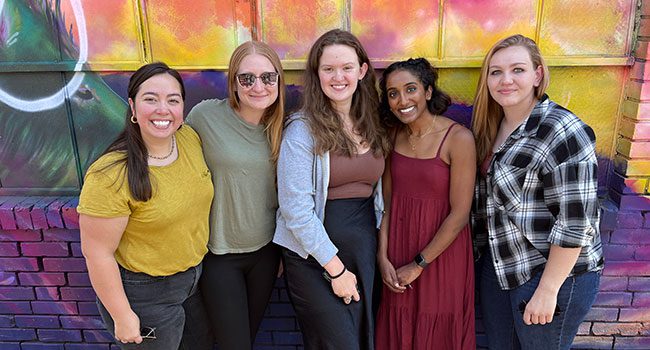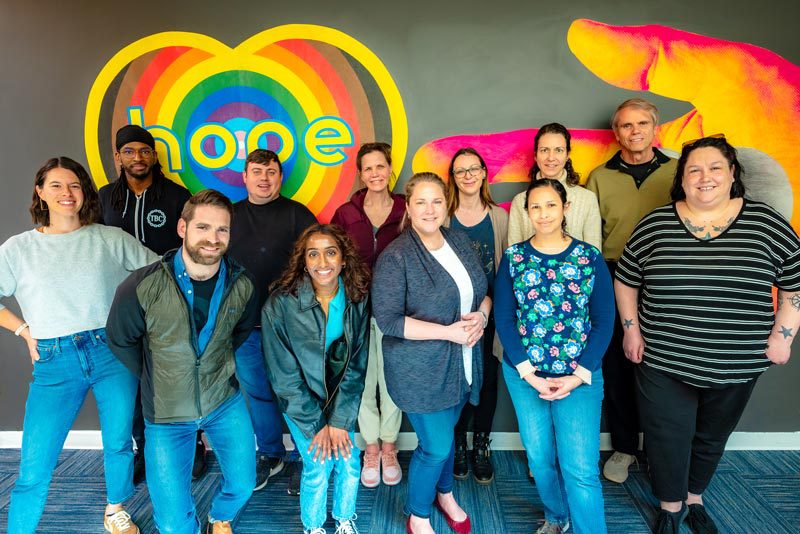About Us
The end of human trafficking. That’s our vision.
We believe a comprehensive response to human trafficking in Colorado is possible.
Our passionate team is on a mission to inform social change that ultimately eliminates human exploitation.
Will you join us?
Our Story
In 2005, under the leadership of Amanda Finger, we formed a state chapter of the national NGO Polaris Project. At the time, the national response to human trafficking was still very new. Amanda was moved by a desire to see her generation uphold human rights more effectively. In Colorado, early efforts to combat human trafficking were isolated, uncoordinated, and disconnected from data. This reality led Amanda, alongside Dr. AnnJanette (AJ) Alejano-Steele, to establish an independent 501(c)3 in 2009 called the Laboratory to Combat Human Trafficking (LCHT).
In the years since, our programs have become critical to supporting survivors and strengthening Colorado’s response.
Since our official launch in 2009, we have:
- Conducted four major research projects in Colorado to drive action, inform policy change, and promote a more data-informed response to human trafficking
- Led the operation of Colorado’s 24/7 Human Trafficking Hotline, connecting callers and texters with a growing statewide network of agencies who engage in support services
- Trained more than 53,000 community members and professionals in a position to identify and serve survivors
- Supported nearly 200 aspiring human rights leaders through our Leadership Development Program



Who We Help
Who experiences human trafficking in Colorado? These stories are based on the experiences of actual survivors. They are featured in This is Human Trafficking, Colorado’s public awareness campaign that promotes our 24/7 hotline.
LCHT exists to make stories like this a thing of the past. Your support can make that possible.
Support the movement to end human trafficking.
What we do
Training and Education
“LCHT’s training was incredibly valuable to our staff and volunteers. We were given tools to initiate conversations with young people who may be involved in trafficking or at risk for this crime.”
Kelly Miller, CASA of the Continental Divide
Research and Action
“The anti-human trafficking movement needs evidence to inform not only policy but also service delivery — so that we can stop guessing, and start utilizing sustainable, survivor-informed practices to serve our most vulnerable community members.”
Kara Napolitano, LCHT Research and Training Manager
Hotline and Resource Directory
“I live on the Western Slope surrounded by rural agricultural communities. Labor trafficking happens here way more than it should and there aren’t adequate resources to help survivors. Working on the hotline gives me hope for the future!”
Kim Smith, Volunteer Hotline Advocate
Leadership Development
“LCHT has shown me what true partnership means. Human rights work can only move forward through collaboration and trusting relationships. I have learned that there is room for love, self-care, support, and trust even when you are working to combat such a terrible crime.”
Natcha Connot, 2022 LCHT Intern
Our values
What’s Happening in Anti-Trafficking
Our Stories
7 Surprising Facts About Human Trafficking in Colorado
Human trafficking is a complex crime that is often misconstrued by the media and Hollywood. While many people associate trafficking with distant places or dramatic abductions, the reality is far closer to home.
Q&A with Research Director, AJ Alejano-Steele: Addressing Root Causes of Human Trafficking
We recently sat down for a conversation with Annjanette Alejano-Steele (AJ), Research Director and Co-Founder at LCHT. Learn why research is critical to creating effective strategies that address the underlying causes of this complex issue—and what keeps her motivated to do this work.
Knowledge is Power: Keeping Colorado’s Youth Safe from Human Trafficking
At the Laboratory to Combat Human Trafficking, we train professionals who may encounter situations of exploitation in their line of work—nurses, doctors, foster care families, educators, police officers, and more. But did you know that we also directly interact with and train youth?


